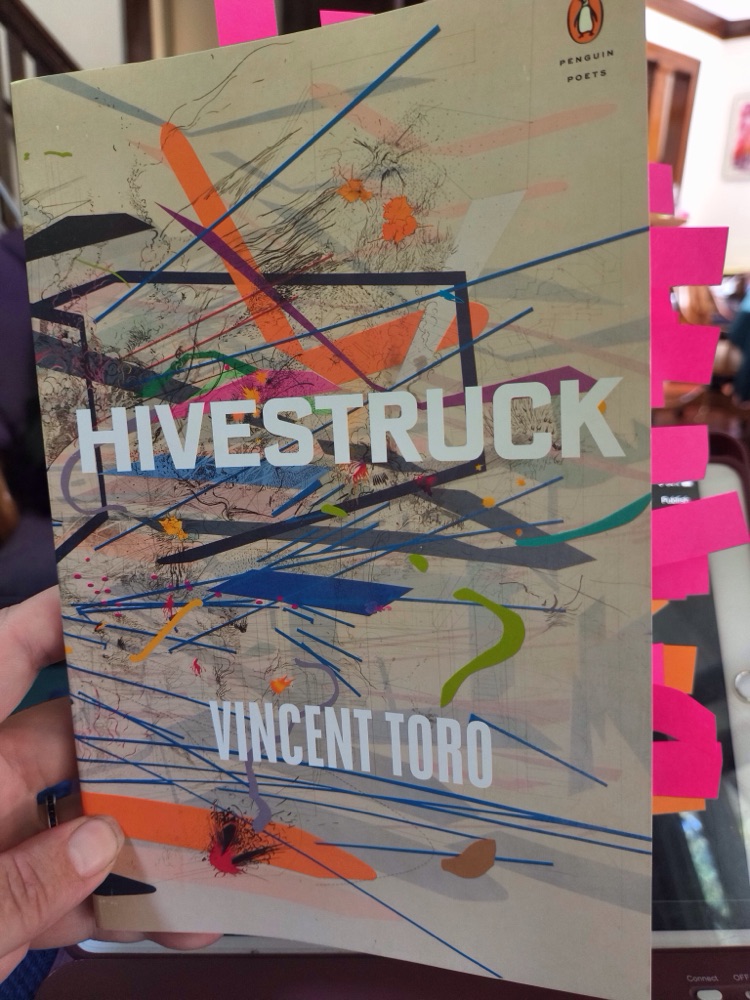Most of the book reviews I post here are relevant to “work stuff”. This one is a book of poetry. Poetry, and song lyrics, are a strange kind of compression algorithm that works a bit like a jpeg, forcing us to interpolate between known points.
This book of poetry is explicitly about technology, and about a Latinx perspective on it. There’s “Ofrendo for the Arecibo Observatory”. I hadn’t thought about the fact that of course it hosted school tours, just like I went on school tours of Hanford’s nuclear plants.
There’s “Content Moderator’s Lament”, which highlights the real harm it takes to keep our brains from melting by exposure to the raw internet, and how that harm, like many kinds of pollution, is displaced to the global south.
I recommend buying this book or getting it from the library, because a couple hours of poetry about technology can help us remember that it’s fundamentally human.
BOT FANTASIA : FOREVER ADA
Ada Lovelace wears a ring that tells you who is thinking about you.
Vint Cerf wears a watch that tells him when to take his pills.
Vint Cerf weeps each time Ada dgs up her father’ sgrave to prove that machines will never achieve cognition.
He tell Ada there is no innovation without a corrupted file or twenty attached
Ada wants to build a cottage out of abacus hallucinations.
Her looms are more than hallucnations. They are schooners.
Charles Babbage breaks his toenail on Ada’s loom.
He wonders how machines will react to written complaints from disgruntled fanboys.
The fanboys campaign to censor any alternative backstories about Ada. Especially any backstory that identifies her as a woman.
Vint Cerf calls to remind them that we are all at the mercy of designers, our days impacted by their proclivities and their blind spots.
Ada turns their pitchforks to ash by informing them that free data is always two directional, that what they give they give for free, but the emperor will charge them later if they want to visit their pets at the mall, that somewhere there is a network able to sort through the muck of every database, that someday this network will birth a toaster able to cite Cixous and Spivak and build a city where all means of transport will be imaginary, a city that can experience imposter syndrome and wonder if it can even call itself a city.
From the pitchfork ash, Ada constructs a simulacrum that can play croquet with her and let her win. The simulacrum confesses to her that it wants to paint like Caravaggio.
Babbage decides he wishes to dine with the simulacrum. Vint wants it to clean his pool. The simulacrum tells them it feels used, accuses them both of not considering its own desires.
Vint asks the simulacrum what it desires
Babbage insists this is not possible because desire requires imagination, and machines lack imagination.
The simulacrum asks Babbage how many men he has met who actually possess imagination.
Ada dissents and professes that the distinction between need and desire is the distinction between hardware and software.
Vint interrupts them to serve coffee, says that the difference is that a person can weep.
Ada argues thot the difference is that a person is incapable of telling the truth. The weeping is just an accidental subroutine.
The simulacrum retorts that the only difference between machines and humans is that machines know that they are machines, while humans are convinced they are not machines.
In the denouement, Grace Hopper swoops in on the wings of a silicon angel to remind them all it was a woman who wrote the language that is allowing them to communicate. She accuses them of being COBOL thieves.
Being unable to dispute her accusations, they all agree to put aside their differences and have a delightful 3D-printed dessert.
—- Vincent Toro

